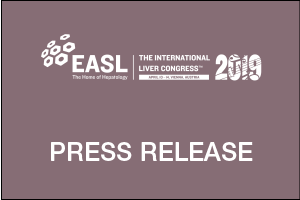
ILC 2019: Oral faecal microbiota capsules reduce hospitalizations, improve duodenal microbial diversity, and enhance cognitive function when added to standard-of-care in individuals with cirrhosis and recurrent hepatic encephalopathy
12 April 2019, Vienna, Austria
EASL (EUROPEAN ASSOCIATION FOR THE STUDY OF THE LIVER)
Faecal microbiota transplantation (FMT) performed using oral capsules is effective and well tolerated in individuals with cirrhosis and recurrent hepatic encephalopathy, according to the results of a study presented today at The International Liver Congress™ 2019 in Vienna, Austria. The study, which enrolled individuals already receiving standard-of-care treatment, found that oral FMT reduced hospitalizations, improved duodenal microbial diversity, and enhanced cognitive function.
Hepatic encephalopathy (HE) is a neurological syndrome that is a hallmark of liver failure1 and affects up to 40% of individuals with liver cirrhosis.2 Recurrent HE, which is defined as two or more episodes of HE over a period of 6 months,2 leads to frequent hospitalizations1 and to an increased risk of irreversible brain injury.3 Standard-of-care for both episodic treatment and the prevention of recurrence is lactulose, with or without the antibiotic rifaximin.2 These treatments and other antibiotics used during the management of cirrhosis can lead to changes in the gut microbial landscape (dysbiosis), triggering further episodes of HE and leading to a microbiota profile that has been linked to cognitive impairment and systemic inflammation.3
FMT using an enema formulation has been shown to reduce hospitalizations, improve cognition, and reduce dysbiosis in individuals with recurrent HE.3 The study presented today evaluated the safety, tolerability, and health impact of a new capsule formulation for delivering FMT in a group of 20 individuals with cirrhosis and recurrent HE already receiving lactulose/rifaximin treatment.
This was a randomized, participant-blinded, placebo-controlled study. Individuals were randomized 1:1 to receive 15 FMT capsules (prepared from a single donor with enrichment with beneficial Lachnospiraceae and Ruminococcaceae bacteria) or placebo. Efficacy assessments included endoscopies with duodenal/sigmoid biopsies, stool analysis, and cognitive function assessments performed using the EncephalApp and psychometric hepatic encephalopathy score (PHES). Assessments were performed pretreatment and 2–4 weeks posttreatment, with a 5-month follow-up.
Six individuals in the placebo group required hospitalization/died compared with one in the FMT group (p=0.05). The number of hospitalizations was higher in the placebo (n=9) than in the FMT group (n=1; median 1.5 vs 0; p=0.02). At baseline, the microbial diversity in the stool, sigmoid and duodenal mucosa was similar between groups. Post-FMT, there was a significant increase in duodenal mucosal microbial diversity and relative abundance of Ruminococcaceae and Bifidobacteriaceae bacteria, with a decrease in Streptococcaceae and Veillonellaceae in FMT recipients. No changes in stool/sigmoid diversity was seen post-FMT but significant reductions in Veillonellaceae were observed post-FMT in the sigmoid mucosa and stool. Cognitive function, as assessed using EncephalApp scores, improved significantly in the FMT group vs the placebo group (p=0.02).
‘Faecal microbiota transplant using a single stool donor enriched with bacterial species we know are deficient in this population is a promising approach to the potential treatment of patients with cirrhosis and recurrent HE,’ said Dr Jasmohan Bajaj from Virginia Commonwealth University and the McGuire VA Medical Center in Richmond, USA. ‘Larger studies are now needed to confirm these findings.’
‘Oral faecal microbiota capsules are an interesting innovation to modulate the gut microbiota in cirrhosis and could represent a novel treatment strategy to reduce the burden of recurrent hepatic encephalopathy’ said Annalisa Berzigotti, Associate Professor of Medicine at the University Clinic for Visceral Surgery and Medicine, University of Berne, Switzerland, and a member of the EASL governing board.
###
About The International Liver Congress™
This annual congress is the biggest event in the EASL calendar, attracting scientific and medical experts from around the world to learn about the latest in liver research. Attending specialists present, share, debate and conclude on the latest science and research in hepatology, working to enhance the treatment and management of liver disease in clinical practice. This year, the congress is expected to attract approximately 10,000 delegates from all corners of the globe. The International Liver Congress™ 2019 will take place from 10–14 April 2019 at the Reed Messe Wien Congress and Exhibition Center, Vienna, Austria.
About The European Association for the Study of the Liver (EASL)
Since its foundation in 1966, this not-for-profit organization has grown to over 4,000 members from all over the world, including many of the leading hepatologists in Europe and beyond. EASL is the leading liver association in Europe, having evolved into a major European association with international influence, and with an impressive track record in promoting research in liver disease, supporting wider education and promoting changes in European liver policy.
Contact
For more information, please contact the ILC Press Office at:
- Email: press2@easloffice.eu
- Telephone: +44 (0) 1444 811099
Onsite location reference
Session title: ‘Cirrhosis – Clinical aspects’
Time, date and location of session: 17:30–17:45, 12 April 2019, Hall C3
Presenter: Jasmohan Bajaj, USA
Abstracts: Fecal microbiota capsules are safe and effective in patients with recurrent hepatic encephalopathy: A randomized, blinded, placebo-controlled trial (PS-087)
Author disclosures
This study was partly supported by NIH NCATS R21TR002024 and VA Merit Review CX001076 to Jasmohan Bajaj
References
- Swaminathan M, et al. Hepatic encephalopathy: current challenges and future prospects. Hepat Med. 2018;10:1–11.
- Vilstrup H, et al. Hepatic encephalopathy in chronic liver disease: 2014 Practice Guideline by the American Association for the Study of Liver Diseases and the European Association for the Study of the Liver. 2014;60(2):715–35.
- Bajaj JS, et al. Fecal microbiota transplant from a rational stool donor improves hepatic encephalopathy: A randomized clinical trial. 2017;66(6):1727–38.
